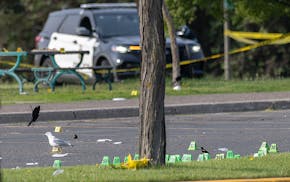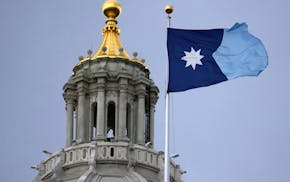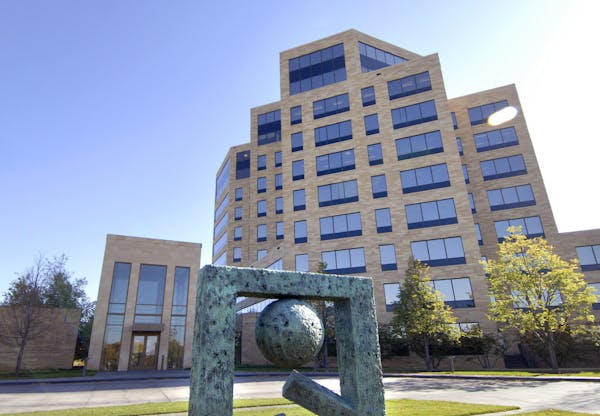FERGUS FALLS, Minn. – At a VFW in this western Minnesota city, about 150 people showed up on the third anniversary of the Jan. 6 riot at the U.S. Capitol to watch a documentary that blames much of the violence that day on escalation by law enforcement.
Among those in attendance: three Minnesotans who've been federally charged in the riot and two GOP state representatives. Steve Boyd, a Republican running for Congress in Minnesota's Seventh District, introduced the film.
"It's quite the story," Boyd said.
This month, part two of the documentary, produced by the Epoch Times, a far-right media company affiliated with the Falun Gong religious movement, was shown during a conservative women's event at a Burnsville Library.
Tayler Rahm, a Republican running for the state's Second Congressional District seat, was there. A couple weeks earlier, Rahm suggested in a public debate that there's a two-tiered justice system that treats Capitol rioters worse than those who rioted in Minneapolis after the murder of George Floyd in 2020.
"Look at what they're doing to individuals out on Jan. 6 compared to how they treat people here in Minneapolis," said Rahm, a criminal defense lawyer seeking to challenge Democratic U.S. Rep. Angie Craig. Rahm didn't respond to requests for comment.
Many Republicans in Minnesota and the U.S. are showing increasing sympathy toward Jan. 6 rioters and, in some cases, attempting to downplay the violence of that day as former President Donald Trump seeks a return to the White House. Some GOP candidates are sharing such feelings openly while other elected officials stay silent about what they think about the Jan. 6 violence.
Boyd, who's mounting a primary challenge against GOP U.S. Rep. Michelle Fischbach, asked whether Jan. 6 rioters "are being persecuted for being in opposition to a political power."
"It's no secret they hate Trump, so anyone associated with him — 'If we can take this group and label them insurrectionists, we need to make that narrative work,'" Boyd, a Christian conservative from Kensington, said in an interview.
Boyd said he hasn't met anyone who disagrees with punishing those who broke windows, vandalized the Capitol, assaulted police officers or forced their way into the building. But he said it doesn't make sense to prosecute someone who walked into the Capitol "through an open door," looked around and then left.
Rosemarie Westbury of Lindstrom, whose husband and three sons face federal charges related to Jan. 6, framed that day as inspirational, not insurrectionist.
"Was there some violence? I suppose there was," Westbury, who was not charged related to the Capitol violence, said at the Fergus Falls event. "I personally didn't see it, except when the police were lobbing these grenades and flash-bangs out at us."
Minnesota DFL chair Ken Martin said "this revisionist history is just completely unacceptable."
"This wasn't just some sort of group of tourists that were strolling through the Capitol sightseeing," Martin said.
About 140 police officers were assaulted at the Capitol on Jan. 6, according to the U.S. Attorney's Office for the District of Columbia. More than 1,200 people have been charged in connection with the riot.
A Washington Post-University of Maryland poll published in January found that 42% of Republicans say punishments for Jan. 6 have been "too harsh." About 7 in 10 said too much has been made of the riot and it's "time to move on."
A quarter of the Americans polled said the FBI might have instigated the riot, something conservative media have promoted without credible evidence.
"There are large groups within the Republican party who don't think [President Joe] Biden was elected legitimately, who don't think Jan. 6 was a big deal, who think the FBI was in charge [of perpetrating the riot]," said Michael Hanmer, director of the University of Maryland's Center for Democracy and Civic Engagement.
"It's not that conspiracy theories are new — they've been around forever. It's that they can get accelerated so much more quickly now, and people in leadership positions are accelerating them in a way that's relatively new," he added.
Republican members of Congress have encouraged these revisionist histories. U.S. House Republican Conference Chair Elise Stefanik, who's seen as a contender to be Trump's running mate, recently referred to riot defendants as "hostages."
And this month, GOP U.S. Rep. Matt Gaetz and more than 60 other House Republicans introduced a resolution stating that the former president "did not commit an insurrection."
Republicans in Minnesota's congressional delegation have stayed silent on the matter.
In the immediate aftermath of the riot, House Majority Whip Tom Emmer called it an "unacceptable display of violence that runs counter to everything we stand for."
Fischbach said at the time that "the violence that we're seeing, especially toward law enforcement, is unacceptable." Fischbach's and Emmer's offices did not respond to requests for comment over the past month about whether they stand behind their original statements.
GOP U.S. Rep. Brad Finstad, who wasn't serving in Congress at the time, also didn't respond to requests for comment. Republican U.S. Rep. Pete Stauber, who represents northeastern Minnesota, declined to comment, though his spokeswoman sent a statement decrying an abundance of media reporting on Jan. 6 in lieu of reporting on other national crises, such as crime and inflation.
David Hann, chair of the Republican Party of Minnesota, said in an interview that he doesn't hear much about Jan. 6 other than from Democrats who "want to accuse everybody of being, I guess, an insurrectionist." Hann also contrasted Jan. 6 with the Minneapolis riots after Floyd's murder.
"I think it's interesting, in my opinion, that with the huge riots we had here, there's been virtually nothing prosecutorially done to bring anybody to account," Hann said.
Fewer people were charged related to the Minneapolis riots, but several who committed arson were sentenced to years in prison.
Hann said anyone, Republican or Democrat, should be held accountable for bad behavior, "and I trust that's what's going on with Jan. 6."
Martin, the DFL chair, said he's alarmed at how conspiracy theories and revisionist histories of Jan. 6 have "become so mainstreamed and acceptable" within the Republican Party.
"Any attempt to whitewash [Jan. 6] after the fact is just doing exactly what Donald Trump has been doing all along: trying to pull the wool over the eyes of the American people and try to create some sort of history that's just not true here," he added.
Democratic U.S. Rep. Dean Phillips, who represents Minnesota's Third District, was in the House chamber when rioters broke into the Capitol on Jan. 6.
"[Capitol police] slammed the doors, moved furniture in front of them, announced over the loud speaker to take cover behind the chairs and put on masks, or gas masks. And we were told to find something to defend ourselves," Phillips said in an interview Thursday. "People crying, most people calling or texting home saying goodbye, because at that moment, we assumed they had guns and they were coming for us."
"For anybody to … minimize what happened is doing our country a disservice," Phillips said.
Gregg Peppin, a longtime Minnesota GOP political consultant, said Jan. 6 was clearly a riot and a "black mark on our nation's history."
But Peppin said the GOP's deep election skepticism must be understood in the context of 2020, when COVID-19 forced rapid, aggressive changes to the election system. Those changes prompted some to doubt the election's integrity, and Trump fueled that fire by claiming the election was stolen, Peppin said.
Reviews in state after state have upheld Biden's win.
"I talk to people in my area that were just like, 'Oh, yeah, the election got stolen.' People I respect in the community, see in church and around town. It surprised me," Peppin said. "Really? Trump lost, he did. They say, 'No, there's enough red flags.' It gave people pause."

A 23-year-old woman was killed in 'war zone' shooting at Minneapolis' Boom Island park

Layoff notices go out to state workers as Minnesota lawmakers continue to debate state budget
Man guilty of robbing postal carriers in Edina, Brooklyn Center to carry out check fraud sentenced to prison
At Day 3 of Derrick John Thompson trial, the intertwined fates of a vicious car crash


